How to eat healthily on £1 a day
- Published
- comments
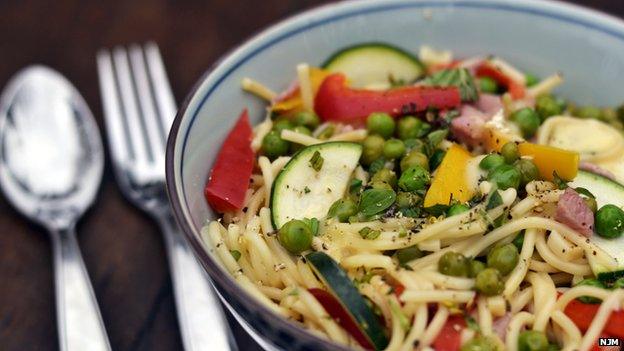
Oh My God Dinner: one of several main dishes that costs as little as 37p a serving
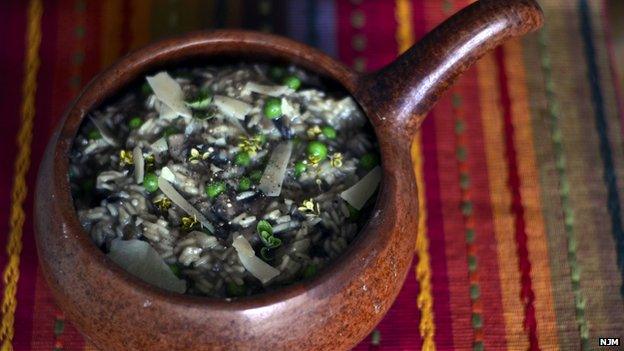
Mushroom and pea risotto: 37p a serving
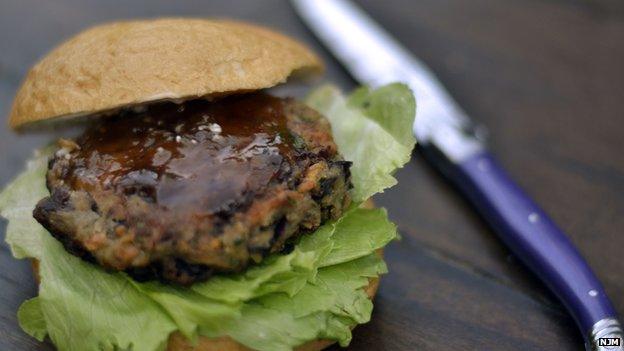
Carrot, kidney bean and cumin burger: 42p a serving
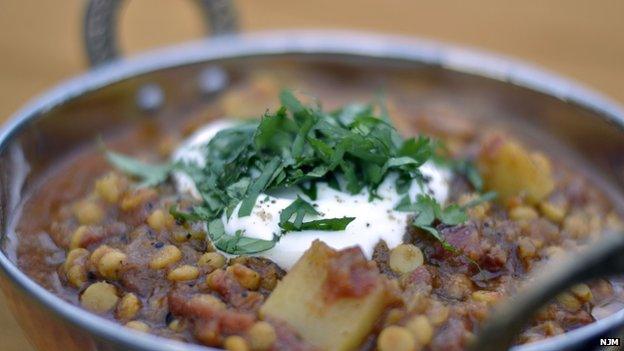
Lentil and tomato curry with pitta: 42p a serving
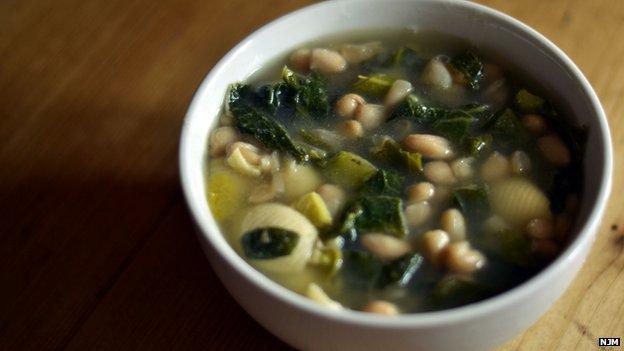
White bean, kale and pasta soup: 41p a serving
Starting on Monday 29 April, 5,000 Britons will be challenging themselves to live on just £1 a day for five days, as part of a campaign by the Global Poverty Project. , external
But is it possible not just to survive, but also to eat a balanced and healthy diet on that sort of budget?
Over five days, I set out to see if it was possible to include sufficient fruit, vegetables, protein and carbohydrates in my food to do that, spending no more than £1 a day - while trying not to lose sight of the fact that eating should be a pleasure, not just a necessity.
Coffee, alcohol, cakes and even salad are just too expensive. But there are plenty of surprising goodies that are very much on the menu.
Day 1: Amount spent 97p
Did you know you can buy an egg for just 8.7p? It may not be an ethical egg, and of course you have to buy 30 to get that price.
But when you are on a real budget, it still gives you valuable protein and great vitamins.
So including one piece of toast, with margarine and a cup of tea, my breakfast costs me 14p.
Lunch is a ham sandwich, at a cost of 29p. Good protein, but that is nearly a third of my daily budget gone in just a few bites.
And come 3pm, a nasty thought is already beginning to insinuate itself. At first just a question mark, it develops more and more into a certainty. To start with it is mere peckishness. Then, undeniably, it reclassifies itself as hunger.
So I gorge on a value scone (5p) with jam (1p), and feel better. And I eat an apple.
Contemplating dinner, it is time to consult an expert.
Jack Monroe spent a year and a half out of work, and learnt to survive on next to nothing.
According to her blog, external, Oh My God Dinner is the result of surprise discoveries of anything left in the bottom of the fridge.
With cubes of melting Brie on top and scraps of bacon, it is full of varied flavours. We added peppers for extra colour and texture.
Day 2: Amount spent £1
Breakfast, with porridge and two slices of bread and jam, comes to 18p.
So I splash out at lunchtime, and make myself a morale-boosting BLT. This is only possible with the price of cooking bacon (see above).
But lettuce at 4p for a single leaf, and a tomato at 5p, are real luxuries in this sort of diet, making lunch 26p.
And even more indulgent is a banana. All 14p of it.
Dinner is a true belly-filler, but with three vegetables, pretty healthy too.
Day 3: Amount spent 94p
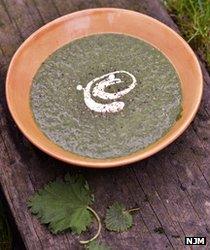
Spring is the perfect time for nettle soup
Today, while walking the dog in our local woods, my wife and I have a brainwave.
The blackthorn is blooming, and everywhere bright green stinging nettles are pushing up through the undergrowth.
It is the perfect time of year for nettle soup.
Not quite free food though: the recipe has potatoes, butter and cream.
And you need plenty of patience to strip each plant of its leaves.
With two slices of value bread and margarine to go with it, lunch comes in at a below-average 17p.
And with dinner of carrot, kidney bean and cumin burger, I can almost believe I am eating meat.
Day 4: Amount spent 91p
Did I mention biscuits?
They are not only a significant morale booster, but cheap as well. A packet of value digestives costs 30p, and contains 30 biscuits.
And for a Brit, there can be no greater comfort food than a custard cream. With a cuppa.
Tea with three value custard creams will cost in the region of 4p (31p buys you 36 biscuits).
For anyone on a budget, this is surely a piece of heaven.
Jack Monroe's little tip is even cheaper. Have a lemon curd sandwich, for around 3p.
And talking of national favourites, what Brit wouldn't look forward to a curry?
Lentil and tomato curry, with a healthy dollop of Greek yoghurt and chopped coriander, is a delight to the taste buds as well as to the tummy.
Day 5: Amount spent £1
The strains show when someone arrives in the office with several large boxes of free crisps. The expensive hand-made kind too. While I tuck into a cream-cheese sandwich, with four slivers of cucumber.
But my mission is to eat healthily, so I need to find cheaper fruit.
After scouring the supermarkets, the cheapest apple I have come across is 10.3p; the cheapest banana is 14p. Salad is out of the question.
I go to my local market an hour before closing time, where fruit and veg is sold by the £1 tub.
Surely they will be giving it away? No. Despite an attempt at bargaining, the cheapest apple is 14p.
"Fixed prices!" explains the vendor.
Time for a bowl of hearty but nourishing soup.
So after five days I have spent just £4.93.
I consult a dietician to see how well I've done. She is impressed by the variety of food I've eaten.
"Those dinners looked great," says Alison Hornby, of the British Dietetic Association. "But I would say they may have been slightly smaller than you required. You may have felt hungry at the end of a meal."
After some quick calculations, she confirms that I am well short on my calorie intake.
"You could have done with something a bit more substantial," she says.
While I end up feeling a little virtuous, this has, of course, been an entirely artificial exercise.
"You're doing this as an experiment for five days," says Jack Monroe. "But when it is your way of life, and you haven't got any choice over it, it's not a fun experiment."